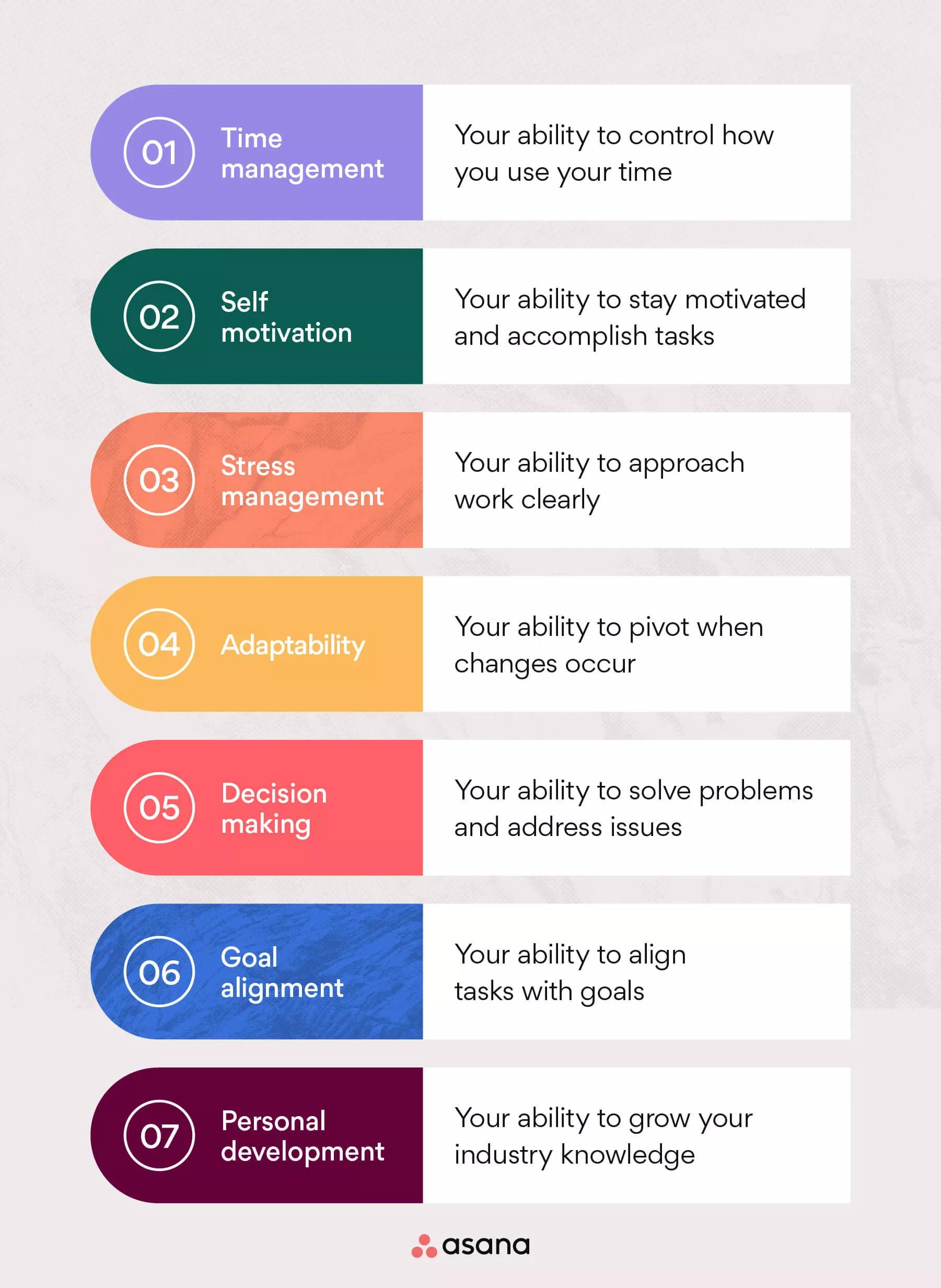Antwort What are the 5 self management skills? Weitere Antworten – What are the objectives of self-management
Self-Management: The ability to regulate one's emotions, thoughts, and behaviors effectively in different situations. This includes managing stress, controlling impulses, motivating oneself, and setting and working toward achieving personal and academic goals.These skills can increase employee innovation and decision-making abilities. When it comes to the individual level, self-management matters because it helps you to reach your own goals. If you can't manage your thoughts, behaviors, and emotions, you'll never be able to focus on your goals.Definition of Self-Management:
Management by oneself of oneself or one's. affairs Self-management is about finding the self- control and mastery needed to take control of one's. work (e.g., to manage one's time, workflow, and. communication)
What is the key of self-management : Some key strategies for self-management include setting goals, prioritising, organisation and time management (this includes planning antecedent and consequence actions, which you'll perform to counter bad habits), and dedication and focus. Most importantly, don't be too hard on yourself.
What are the three keys to self-management
Step-by-step explanation:
- Initiative: Initiative is being able to work without always being told what to do.
- Organisation. If you are organised in life and work it means you can plan your time and the things you have to do.
- Accountability.
How can I manage myself : Here are seven ways you can develop your self-management skills:
- Embrace Your Strengths. Self-managers understand their strengths and play to them.
- Adapt to Challenges.
- Nurture Your Relationships With Others.
- Set Goals for Yourself.
- Understand Your Emotions.
- Be Patient.
- Prioritize Your Well-Being.
Some people recognize the symptoms of poor self-management when they reach a level of stress than they can't bear. Only then they care about improving their skills. Unfortunately, many others are not able to detect the causes and blame external factors for their problems. They don't usually recover.
This includes managing stress, delaying gratification, motivating yourself, and setting and working toward personal and academic goals.
What is the key of self management
Some key strategies for self-management include setting goals, prioritising, organisation and time management (this includes planning antecedent and consequence actions, which you'll perform to counter bad habits), and dedication and focus. Most importantly, don't be too hard on yourself.Here are a few ways you can improve your self-management skills:
- Assess your strengths.
- Prioritize your responsibilities.
- Develop organizational systems.
- Create strict deadlines.
- Perform one task at a time.
- Practice patience.
- Take care of your health and wellness.
- Evaluate your progress.
This includes managing stress, delaying gratification, motivating yourself, and setting and working toward personal and academic goals.
Be self-disciplined.
You always have a choice, so don't shy from it: Choose and choose without regret. Look forward and be enthusiastic. Keep healthy and take care of yourself. Exercise your mind, body and spirit so you can be someone people count on, and so you can live expansively and with abundance.
What is the golden rule of self : It is to treat yourself in a way that you treat others. It is to respect, love, protect, and care for yourself each and every day. It is to let go of judgment and criticism and replace it with patience and gratitude. It is to move away from comparison and move toward appreciation.
What causes poor self-management : Depression and emotional distress may impair self-management by decreasing motivation, prioritisation skills and problem solving. Negative emotions may also decrease self-confidence and self-efficacy,26 and distress is often present in this vulnerable clientele.
What are the three basic tools of self-management
What are Self Management Skills
- Initiative. Initiative is being able to work without always being told what to do.
- Organisation. Getting organised in life and work means you can plan your time and the things you have to do.
- Accountability. Accountability and responsibility are similar but they don't mean the same thing.
That stack of files, pen, paper and cards are still lying on your desk. All the clutter you left behind on your desk, as well as the incomplete tasks, will come back to haunt you again when you sit on your desk the next morning. This is just one example of poor self-management.1) Debit what comes in – credit what goes out. 2) Credit the giver and Debit the Receiver. 3) Credit all income and debit all expenses.
What is Silver Rule : silver rule (plural silver rules) (ethics) The principle that one should not treat other people in the manner in which one would not want to be treated by them.








